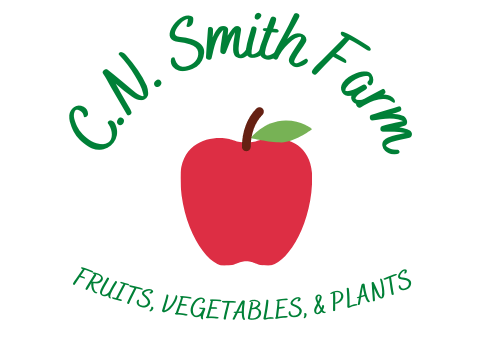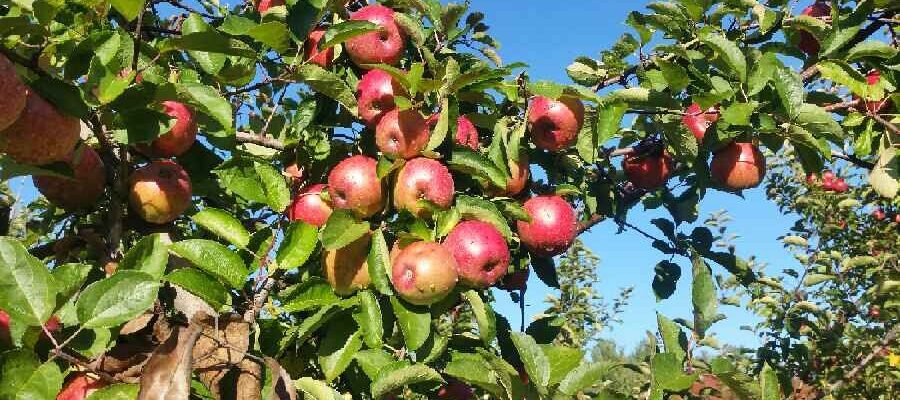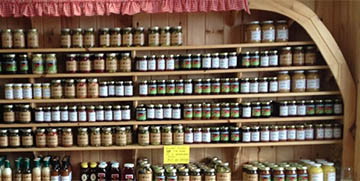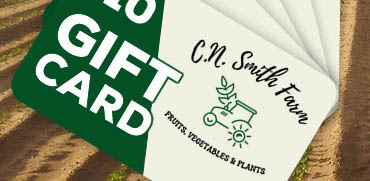How do I pick an apple?
- First look at the apple and decide if it’s the one you want. If you don’t want the apple, please leave it for others.
- Firmly but gently grab the apple and TWIST until it comes off the tree.
How should I not pick an apple?
- Do not tug or yank on the fruit as you may break off the fruit bud. This bud contains next year’s apple! If you break it off, sadly there will never be an apple there again.
- Do not shake the trees. There may be apples out of your reach. We pick those later!
- Do not climb the trees. You could damage the tree, or worse, fall and get hurt.
How come the apples don’t look like “Supermarket” apples?
- Supermarket apples are polished and waxed with carnauba wax (yes, car wax).
- Natural imperfections may be on the surface of our apples. This could be due to weather conditions or other natural causes. Typically the apple remains perfectly fine for consumption.
- We grow many varieties all which have a different look. Some “heirloom” varieties have skin types which are not necessarily pretty. These apples are not typically sold in chain stores.
What is that dull film on the apple?
Apples produce a natural haze which slows the ripening process. Supermarket apples are polished until shiny and the natural haze is replaced by wax. Yum!
Can I eat the apples right off the tree?
It is safe to eat the apples right off the tree. You are welcome to sample the apples (within reason).
How many varieties of apples are there?
- There are thousands of varieties of apples worldwide.
- Smith Farm grows approximately 17 varieties – some you’ve heard of, some you probably haven’t.
- Not all of our varieties may be available for pick your own every season. Some varieties are biennial – meaning they only produce a crop every other year; or some a reduced crop every three years.
What are the trees with tiny apples hanging in bunches?
Crab apples, which come in many sizes and colors, are planted throughout the orchard to help with pollination in the spring time. Good pollination by the bees is necessary for fruit production. They are generally not edible unless used in making
jelly.
There are berries and vines growing near a few of the trees. What are they?
There are a number of weeds and wild berries growing in the great outdoors. In order to protect the fruit trees and the public, we do not spray harmful weed killers. Generally these plants are harmless or only mildly irritating (e.g. poison ivy).
While we do our best to trim weed growth, if you do not recognize the plant, stick to picking the apples.
How does the weather affect apples?
- Dry seasons may result in smaller fruit which tends to have more flavor. A wet season may result in larger fruit however the flavor is sometimes “diluted”. We cannot control Mother Nature.
- Wind, hail and excessive heat may cause skin blemishes. Typically the fruit remains fine inside.
How should I store my apples?
Refrigeration is the key to long term storage. Different varieties remain fresh for differing periods of time however you can typically keep apples for several weeks to a month in the fridge. Apples kept on the counter or in a closed bag will spoil quickly.
Are dogs allowed?
Under Massachusetts’s disability rights law and the federal Americans with Disabilities Act (ADA), people with disabilities may bring their service dogs to all “public accommodations,” including stores, businesses, motels, restaurants, theaters, schools, and more.
These laws do not apply to emotional support animals, therapy dogs, or pets.
Guests with registered service animals are always welcome!
Emotional support animals (ESA’s) are not permitted.
Upon arrival at the farm, you may be asked 2 questions –
- Is service animal required because of a disability?
- What work or task has the service animal been trained to perform?
- Neither ESA’s nor comfort animals are covered by the ADA regulations. These animals can legally be refused entry to the farm based on risk to crops, our own animals and livestock, farm employees and other farm customers.
- Many types of animals can provide comfort and emotional support to their owners, however only service animals are protected by the ADA. ESA’s and comfort animals are not permitted at the farm.
- Registered service animals may be restricted from certain areas of the property for example, produce handling areas (used for washing, packing and storage – risk of food contamination), livestock areas (natural predator/prey relationships that can upset farm animals or potentially be a source of disease transmission)
- Service animals should always be under the control of their handler and must be harnessed, leashed or tethered, unless the devices interfere with the SA’s work, or the individual’s disability prevents use of these devices. Service animals have been trained on how to perform a service to their handler and should be focused on that task.
- If the service animal is behaving in a way that indicates that the animal is not under the control of their handler, or if the handler is not able to control the animal, they may be asked to leave. Examples of this behavior include consumption or produce, urination, marking or defecation in production areas, excessive barking or aggressive behavior.
- Service animals may be given access to the store areas that are generally open to the public. Due to the risk of contamination, SA’s as well as the general public are prohibited from our food processing areas.
- If the animal is not a service animal, you will be asked to remove the animal from the property. If you refuse to leave the property, the police may be called.
- Please plan accordingly and avoid leaving your pets in your car for any length of time.
- Be mindful that you may see our own farm dogs who appear in the store and on the grounds. These dogs serve an important role as protectors of the farm. They are employed to herd livestock and patrol for coyotes, deer, and vermin.
Thank you!
CN Smith Farm



